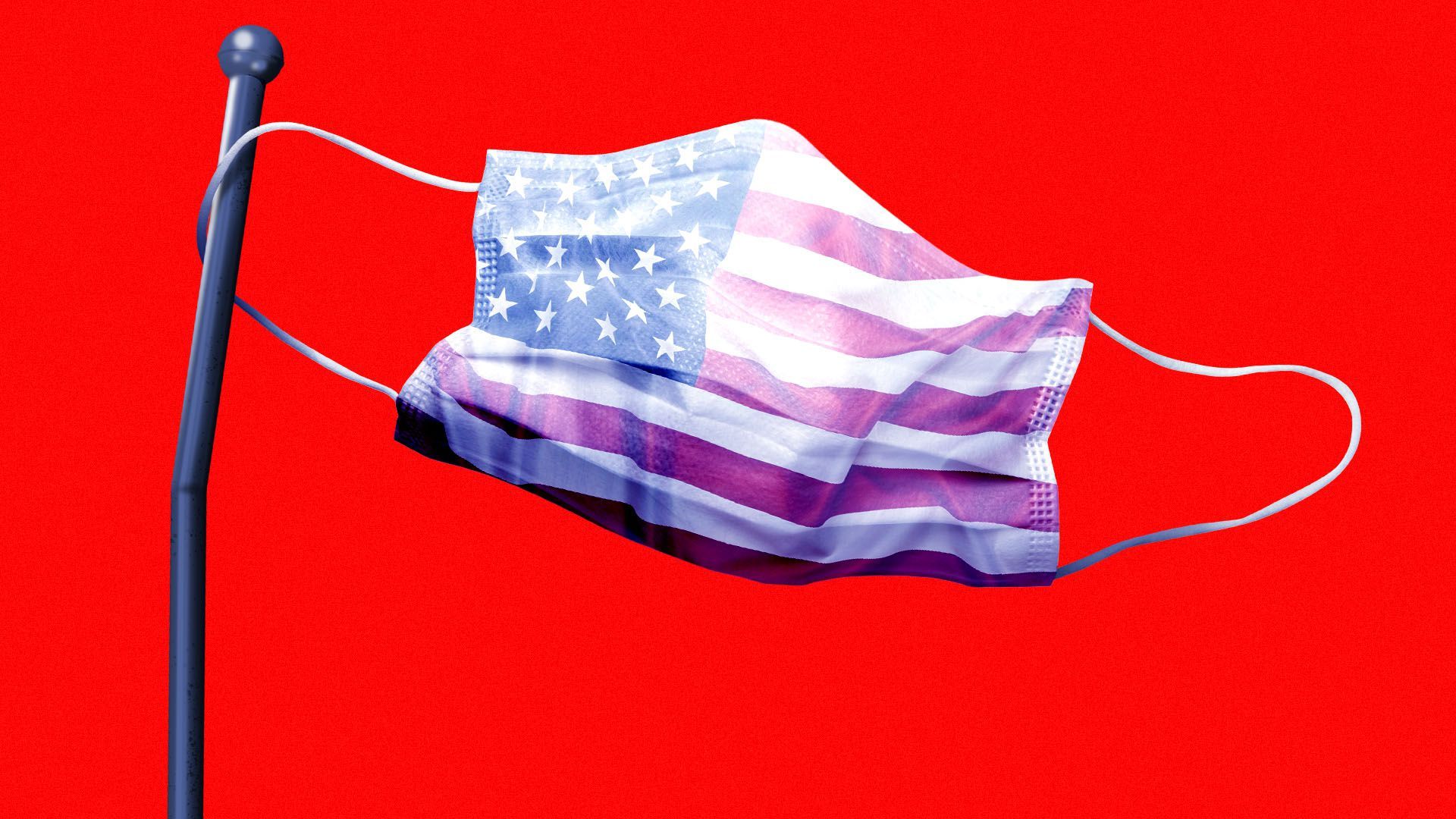The U.S. divide on coronavirus masks
Add Axios as your preferred source to
see more of our stories on Google.

Illustration: Sarah Grillo/Axios
Mask-wearing has become the latest partisan division in an increasingly politically divided pandemic.
Why it matters: It's becoming increasingly clear that wearing even a basic cloth mask is one of the most effective ways to prevent the spread of COVID-19. But whether or not people are willing to wear one has less to do with the risk of the pandemic than their political affiliation.
By the numbers: Results from months of the Axios-Ipsos coronavirus polls show a clear and growing political divide between Democrats and Republicans on mask-wearing habits.
- Nationally, the percentage of Democrats who reported wearing a mask all the time when leaving home rose from 49% between April 10 and May 4 to 65% between May 8 and June 22.
- During the same time period, the percentage of Republicans who reported constant mask-wearing rose from 29% to just 35%.
Context: The political divide Americans are reporting on mask use echoes one seen within nearly all levels of the government.
- President Trump has not been seen to wear a mask, and he told Axios last week that attendees at his Tulsa campaign event on June 20 should "do what they want" on masks, which were not required at the rally.
- Governors in many red states like Nebraska have refused to mandate facial masks in public, even as cases have begun to rise in recent weeks. At the same time, leaders in blue states — especially those that grappled with large outbreaks of COVID-19 — have urged residents to wear masks, with California Gov. Gavin Newsom mandating their use last week as cases in the state passed 4,000 a day.
- The situation is even more divided at the local level, with leaders of red towns in blue states pushing back against mask mandates, and vice versa.
Flashback: Some of the blame for the divide can be traced back to muddled public health messaging on mask use in the early stages of the pandemic, when Americans were urged not to go out and buy masks in bulk because of concerns that there wasn't enough personal protective equipment for front-line health care workers.
- Those fears were real, as government virus expert Anthony Fauci pointed out in congressional testimony on Tuesday. And public health officials worried that pushing masks would inadvertently encourage Americans to continue going out in public at a moment when lockdowns demanded they stay inside.
- Like the divide among experts on whether mass protests would increase coronavirus cases, just the perception that health advice might be based on politics rather than science gives cover to those who would forego masks, especially since the outbreak itself initially seemed like a blue state problem.
Health experts now know that cloth masks are most effective not so much at protecting individuals from infection as protecting the community from infected individuals. But that makes masks as much about social signaling as they are about public health.
- Conservatives who prize individual autonomy over social responsibility experience "a massive pushback of psychological resistance" when presented with mask mandates, says Steven Taylor, the author of "The Psychology of Pandemics."
- That reaction is reinforced "if leaders like Trump downplay the significance of COVID-19 or if they won't wear masks," says Taylor. As a result, wearing a mask in conservative communities means visibly going against public opinion, while the opposite is true in communities where mask use is common.
- The Axios-Ipsos data reflects this reality, showing that while Republicans in blue states use masks less than Democrats, they wear them at higher rates than Republicans in red states, just as Democrats in red states use masks at lower rates than Democrats in blue states.
What to watch: The one factor that seems capable of breaking the political deadlock is the outbreak itself. As cases have skyrocketed in red states like Arizona recently, there's been a significant increase in Google searches for masks.
